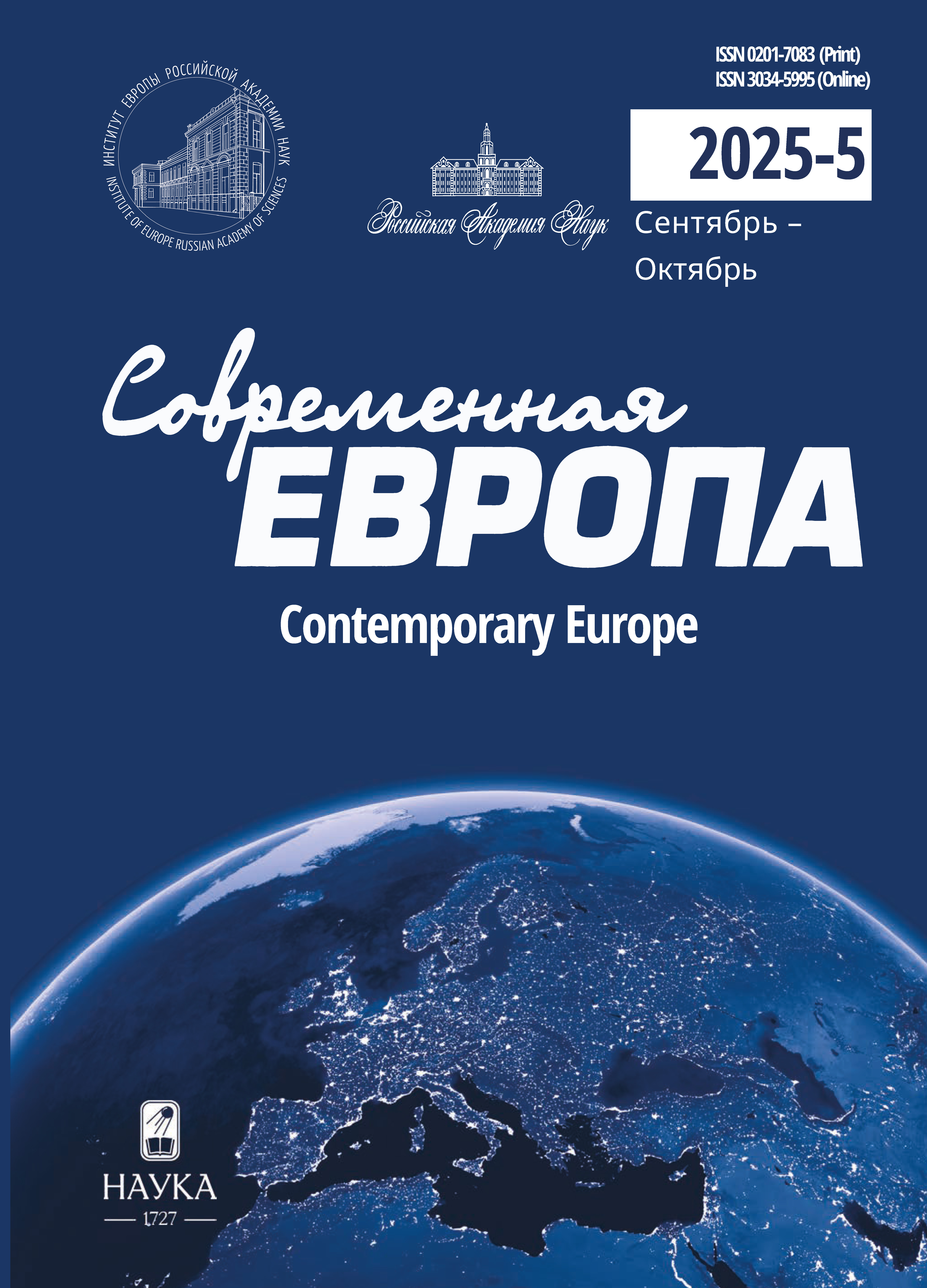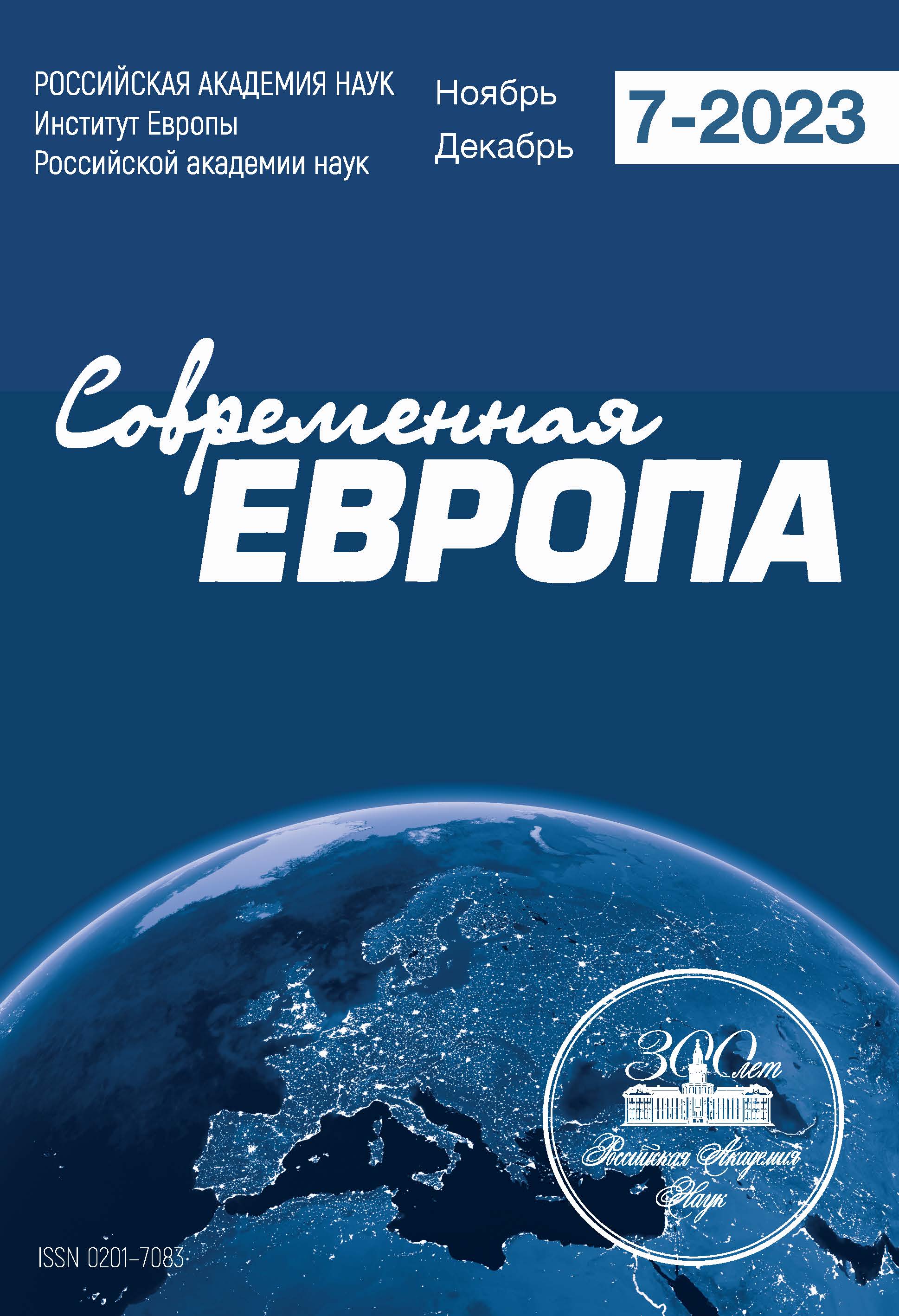Europe in search of new foreign policy strategies: German, French and British think tanks' approaches
- Authors: Timofeev P.P.1, Kharitonova E.M.1, Khorolskaya M.V.1
-
Affiliations:
- Primakov National Research Institute of World Economy and International Relations Russian Academy of Sciences (IMEMO RAS)
- Issue: No 7 (121) (2023)
- Pages: 35-48
- Section: Articles
- URL: https://rjmseer.com/0201-7083/article/view/652171
- DOI: https://doi.org/10.31857/S0201708323070033
- EDN: https://elibrary.ru/RVKDID
- ID: 652171
Cite item
Abstract
The article focuses on the positions and assessments of the current international political situation presented in the think tanks' policy papers in three European states: the United Kingdom, France and Germany. The relevance of the article stems from the new geopolitical reality, that puts pressure not only on national governments, but also on the analytical and expert community and urges them to reassess their views on their countries' foreign policy, come up with new ideas and put forward updated visions of strategic priorities. The authors apply comparative analysis. The article uses specially selected key policy documents of the centers as well as the speeches and articles by the leaders of the think tanks published in 2022 and 2023. It examines and compares expert positions regarding the continued support to Ukraine, interaction with Russia, their views on the EU role in the changing global environment, relationships with the US, China and the Global South. The article identifies common themes and discrepancies between the positions, as well as key ideas and envisioned scenarios of the future developments. Basing on the analysed materials, the authors come to a conclusion that while political leaders make statements about European unity, the publications of the think tanks reveal substantial discrepancies on many concrete issues. European experts share common vision regarding the assessment of the ongoing shifts, agree that the world today is undergoing transformation and fragmentation, highlighting the Ukrainian crisis as a watershed event in the EU foreign policy development. However, British, German and French think tanks have different views on the ways forward in response to the emerging challenges.
About the authors
Pavel Petrovich Timofeev
Primakov National Research Institute of World Economy and International Relations Russian Academy of Sciences (IMEMO RAS)
Email: pavel.timofeyev@yandex.ru
Moscow, Russia
Elena Markovna Kharitonova
Primakov National Research Institute of World Economy and International Relations Russian Academy of Sciences (IMEMO RAS)
Email: ekharit@imemo.ru
Moscow, Russia
Maria Vital'evna Khorolskaya
Primakov National Research Institute of World Economy and International Relations Russian Academy of Sciences (IMEMO RAS)
Email: khorolskaya@imemo.ru
Moscow, Russia
References
- Алешин А.А. (2021) Роль научного дискурса в трансформации стратегии национальной безопасности Великобритании. Анализ и прогноз. Журнал ИМЭМО РАН. № 4. С. 72-84. DOI: https://doi.org/10.20542/afij-2021-4-72-84
- Ананьева Е.В. (2021) Россия в стратегии национальной безопасности Британии. Вестник Удмуртского университета. Социология. Политология. Международные отношения. Т. 5. Вып. 4. С. 453-459. DOI: https://doi.org/10.35634/2587-9030-2021-5-4-453-459
- Барановский В.Г., Соловьев Э.Г. (ред.) (2023) Год планеты: ежегодник. Вып. 2022 г.: экономика, политика, безопасность. Идея-Пресс, Москва. 320 с.
- Белов В.Б., Котов А.В. (2023) Экономические связи России и ЕС в условиях ограничительных мер. Общественные науки и современность. № 2. С. 72-89. DOI: https://doi.org/10.31857/S0869049923020053
- Годованюк К.А. (2021) Фактор "российской угрозы" в стратегии "Глобальной Британии". Британия после брекзита. Отв. ред. К.А. Годованюк. Институт Европы РАН, Москва. С. 145-162.
- Этап специальной военной операции на Украине. Анатомия антироссийской политики в Европе (2022) А.А. Громыко (рук.), А.С. Айвазян и др. Ин-т Европы РАН, Москва, Россия. 194 с. doi: 10.15211/report42022_390
- Обичкина Е.О. (2021) Россия и мир в зеркале французских исследований: наблюдения за наблюдателями. Полис. Политические исследования. № 2. С. 180-191. DOI: https://doi.org/10.17976/jpps/2021.02.13
- Рубинский Ю.И., Синдеев А.А. (2023) Эволюция франко-германского тандема. Институт Европы РАН, Москва. 92 с.
- Тимошенкова Е.П. (2020) Партийно-политическая система Германии в период канцлерства А. Меркель (2005-2017). Институт Европы РАН, Москва. 148 с.
- Чихачев А.Ю., Чагры А. (2020). Участие "мозговых центров" в принятии внешнеполитических решений: опыт Франции. Вестник Забайкальского государственного университета. Т. 26. № 2. С. 97-105. DOI: https://doi.org/10.21209/2227-9245-2020-26-2-97-105
- Ash T., Bohr A, Busol K., Giles K., Lough J., Lutsevych O., Nixey J., Sherr J., Smith S., Wolczuk K. (2013) How to End Russia's War on Ukraine. Safeguarding Europe's Future, and the Dangers of a False Peace. Chatham House, London, UK. 58 p.
- Gomart T., Hecker M. (2023) Chine/États-Unis: l'Europe en déséquilibre. IFRI, Paris, France. 62 p.
- IISS (2022) Strategic Survey 2022: Annual Assessment of Geopolitics.Routledge, London, UK. 401 p.
Supplementary files











